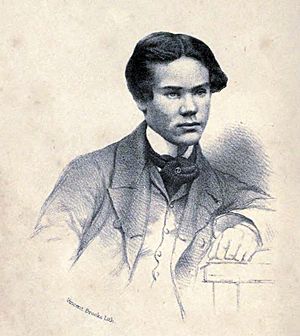Arthur Marcus Hill Cheek facts for kids
Quick facts for kids
Arthur Marcus Hill Cheek
|
|
|---|---|

Arthur Marcus Hill Cheek
|
|
| Nickname(s) | The young martyr of Allahabad |
| Born | 31 July 1840 Evesham, Worcestershire, United Kingdom |
| Died | 16 June 1857 (aged 16) Fort Allahabad, Allahabad, Uttar Pradesh, India |
| Buried |
Fort Allahabad
|
| Allegiance | |
| Service/ |
Bengal Army |
| Years of service | 1857 |
| Rank | Ensign |
| Unit | 6th Bengal Native Infantry |
Arthur Marcus Hill Cheek (born July 31, 1840 – died June 16, 1857) was a young officer. He worked for the East India Company, a big British trading company. He became known as "the young martyr of Allahabad" after he died. Arthur joined the army in India in 1857. He was an Ensign in the Bengal Army. This army was part of the East India Company.
In June 1857, his army unit rebelled. Arthur was captured by the rebelling soldiers. He died on June 16. People who were there said that Arthur refused to give up his Christian faith. This happened even though he was held in the sun. His captors tried to make him change his religion.
Arthur's Early Life
Arthur Marcus Hill Cheek was born on July 31, 1840. His hometown was Evesham, in Worcestershire, United Kingdom. He was the fourth child of Oswald and Emma Cheek.
His special names, "Arthur Marcus Hill," were given to him to honor his Godfather. This was Lord Arthur Marcus Cecil Hill. Lord Hill was a Member of Parliament for Evesham at the time. Arthur was baptized on August 15, 1840. This took place at the Parish Church of All Saints in Evesham.
Joining the Army
When Arthur was 16, his father helped him join the army. His Godfather, Lord Hill, also helped. Arthur got a direct appointment with the East India Company's Army. This meant he didn't have to go to a special military school for two years.
However, he still had to pass an exam. He passed it on February 3, 1857. The next day, February 4, he became an Ensign in the Bengal Army. He left Southampton on March 20. He arrived in Calcutta on April 28.
Arthur was then sent to the 6th Regiment of Bengal Native Infantry. This unit was stationed in Allahabad, India. He took a three-week break to visit family in India. After that, Ensign Cheek joined his regiment on May 19.
The Rebellion in Allahabad
The Indian Mutiny (also known as the Indian Rebellion of 1857) started on May 10, 1857. This happened in a place called Meerut. The officers of Arthur's regiment, the 6th Bengal Native Infantry, trusted their soldiers. About 80 of their soldiers were guarding Allahabad Fort.
On the evening of June 6, the soldiers of the 6th Bengal Native Infantry rebelled. They called their officers to the parade ground. Then, they shot the officers. But Ensign Cheek was not with them. He had gone back to his own home.
Arthur was hurt by a sword cut that evening. But he managed to escape from the Fort. We don't know exactly how he got away. After five days, he was found badly injured in a ravine. Rebellious soldiers from his own regiment found him. They took him prisoner.
On the morning of June 16, Ensign Cheek was brought into the fort. He was on a stretcher. He died that same evening. He was buried in the fort grounds. A Christian funeral was held for him on the morning of June 17.
Arthur's Brave Story
The Reverend Gopenauth Nundy said he was held prisoner with Ensign Cheek. He explained that their captors tried to make them change their religion. They wanted them to switch from Christianity to Islam. The prisoners were kept in stocks in the sun. They were not given water until they agreed.
Reverend Nundy said that Ensign Cheek told him, "Padre Sahib, hold onto your faith – don't give it up!" Another prisoner, Mrs. Coleman, also reported what Arthur said. She heard him say, "be true to your faith and hope."
A special stone tablet was placed on the Cheek family tomb. This tomb is in the graveyard next to the Parish Church of All Saints in Evesham. It has these words:
"The young Martyr of Allahabad" Ensign in the 6th Bengal Native Infantry and 2nd son of O.and E Cheek. born 31 July 1840.
He fell a victim to the wretched Indian Mutiny in 1857 and is memorable for his heroic conduct and faithful confession in his dying moments testified by the encouraging words which he then addressed to a native Christian catechist tormented by the Mohammedans "Come what may, do not deny the Lord Jesus." He was interred in the covered way of the Fort at Allahabad 17th June 1857.
 | Aaron Henry |
 | T. R. M. Howard |
 | Jesse Jackson |

